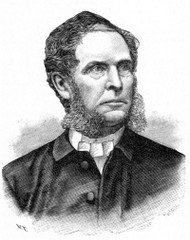James Wheaton Smith, excerpt from Ministers of the PBA
19th Jan 2022
James Wheaton Smith: b. June 26, 1823, Providence, R.I.; d. May 5, 1900, Phila., Pa.; at the age of 10 he removed with his parents to Calais, Me.; baptized at age 12 by James Huckins, uniting with the Baptist church at Calais; entered Brown University in 1844, where he grad. A.B., A.M., 1848; went on to Newton Theological Institution, where he grad. 1851; received honorary D.D., Lewisburg University, 1862; m. Sarah Maria Wilbur (ca. 1830, Boston, Mass.- ), May 11, 1852, Boston; while still a student at Newton he was pastor, Worthen Street Baptist, Lowell, Mass., Mar. 30 (ord. Apr. 6), 1851-May 1853, pastor, Spruce Street Baptist, Phila., Mar. 1853-Mar. 1870, first pastor, Beth Eden Baptist, Phila. (a colony from the Spruce Street church), Apr. 1, 1870-Dec. 8, 1879 (with an associate pastor, William L. Kolb, from May 1879-Feb. 1880), “when his impaired health induced him to tender his resignation,” and where he was voted pastor emeritus, 1880, returned to Spruce Street Baptist, Phila., ca. 1887, where he was also voted pastor-emeritus, Mar. 1893-May 5, 1900, and occasionally preached. Smith was a member of the executive committee of the Bible and Publication Society, member of the American Baptist Missionary Union, corresponding secretary of the Pennsylvania Baptist General Association (the state mission society), and one of the founders of the Young Men’s Christian Association, or Y.M.C.A. He wrote the introduction to Jeremiah Asher’s (q.v.) Autobiography (Phila., 1861) and was the author of Baptists Not Exclusive, Being a Letter to Rev. Albert Barnes, D.D., in Answer to “Exclusivism” (Phila., ca. 1857), 76 pp., and The Life of John P. Crozer (Phila., 1868), 264 pp. He traveled to South America, Egypt, and Palestine. “During what may be called the forcing period in Philadelphia no man has exerted a wider influence. It was often his to set the key-note of denominational thought and feeling, and shape some of the grandest enterprises in the State”—Cathcart’s Baptist Encyclopedia.

